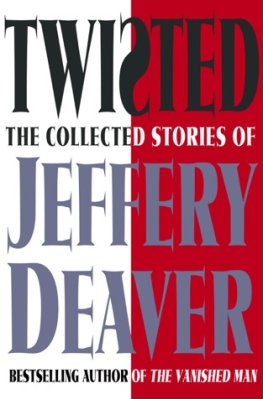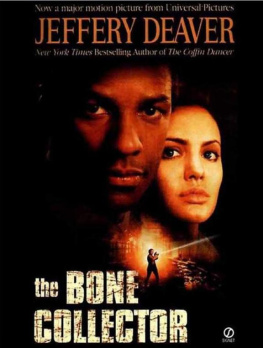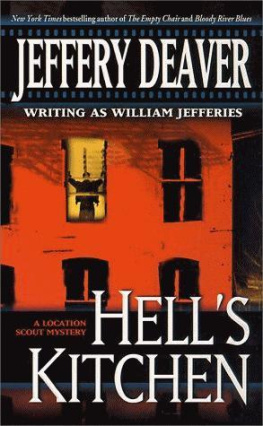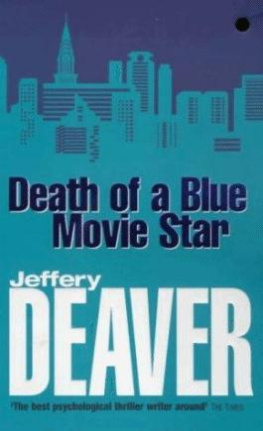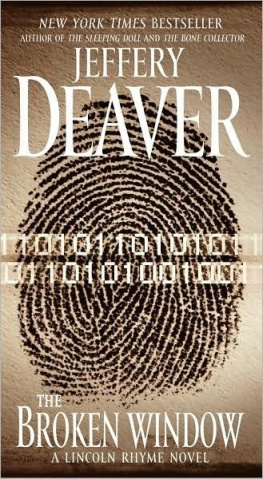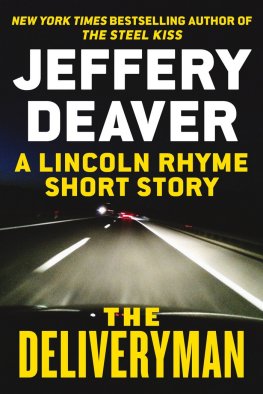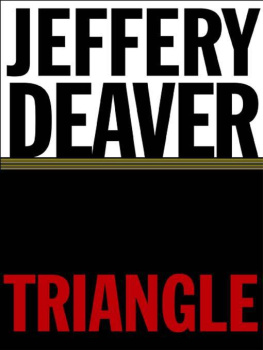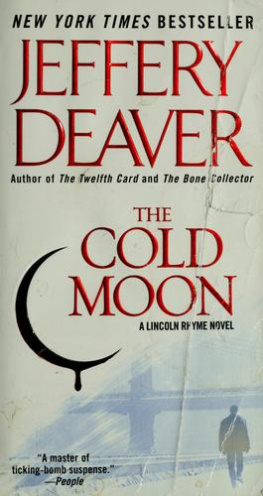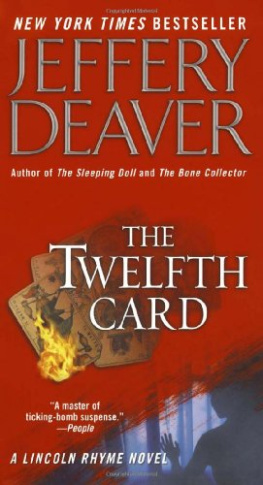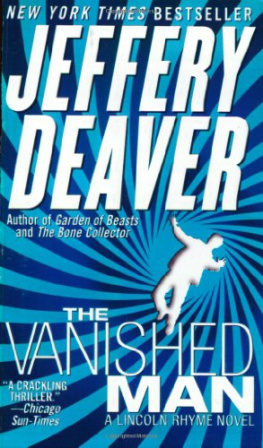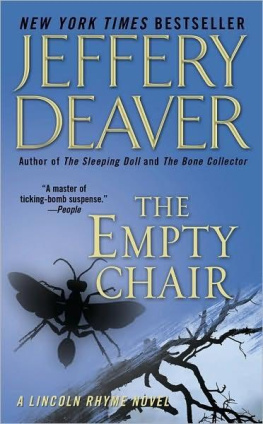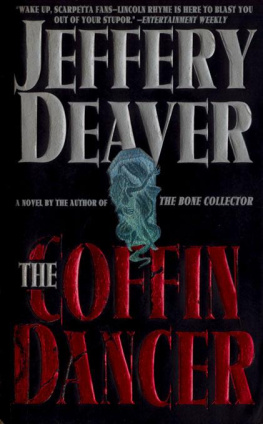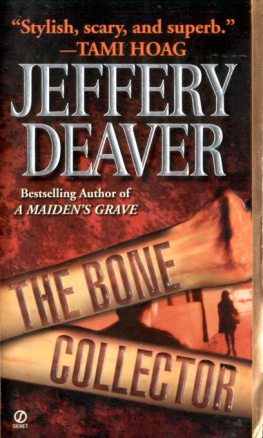Jeffery Deaver
Twisted
The Collected Stories of Jeffery Deaver
To my sister and fellow writer, Julie Reece Deaver
All the Worlds a Stage previously appeared in Much Ado About Murder (Berkley Prime Crime).
Beautiful previously appeared in Ellery Queen Mystery Magazine and The Worlds Finest Mystery and Crime Stories: Third Annual Collection: Vol. 3 (Forge).
The Blank Card previously appeared in Ellery Queen Mystery Magazine.
Eye to Eye previously appeared in Irreconcilable Differences (HarperCollins).
The Fall Guy previously appeared in Ellery Queen Mystery Magazine and The Years 25 Finest Crime and Mystery Stories, 7th Edition (Carroll and Graf).
For Services Rendered previously appeared in Ellery Queen Mystery Magazine and The Worlds Finest Crime and Mystery Stories, 1st Edition (Berkley).
Gone Fishing previously appeared in Ellery Queen Mystery Magazine.
The Kneeling Soldier previously appeared in Ellery Queen Mystery Magazine and The Years 25 Best Crime, 7th Edition (Carroll and Graf).
Lesser-Included Offense previously appeared in Ellery Queen Mystery Magazine.
Nocturne previously appeared in Ellery Queen Mystery Magazine and Blue Lightning (Slow Dancer).
Together previously appeared in Ellery Queen Mystery Magazine, Crimes of the Heart (Berkley) and Opening Shots, Vol. 2 (Cumberland House).
Triangle previously appeared in Ellery Queen Mystery Magazine.
The Weekender previously appeared in Alfred Hitchcock Mystery Magazine and A Century of Great Suspense Stories (Berkley) and Best American Mysteries #1 (Houghton Mifflin).
The Widow of Pine Creek previously appeared in A Confederacy of Crime (Signet) and The Worlds Finest Mystery and Crime Stories: Second Annual Collection: Vol. 2 (Forge).
Without Jonathan previously appeared in Ellery Queen Mystery Magazine.
My experience with the short story form goes back to the distant past.
I was a clumsy, chubby, socially awkward boy with no aptitude for sports whatsoever and, as befit someone like that, I was drawn to reading and writing, particularly the works of short story writers like Poe, O. Henry, A. Conan Doyle and Ray Bradbury, not to mention one of the greatest forums for short surprise-ending drama in the past fifty years: The Twilight Zone. (I defy any fans of the show to tell me they dont get a chill recalling the famous social services manual, To Serve Man.)
When I was given a writing assignment in junior high school, Id invariably try my hand at a short story. I didnt, however, write detective or science fiction stories, but, with youthful hubris, created my own subgenre of fiction: These tales usually involved clumsy, chubby, socially awkward boys rescuing cheerleaders and pompom girls from catastrophes that were both spectacular and highly improbable, such as my heroes daring mountaineering exploits (embarrassingly set just outside of Chicago, where I lived, and where mountains were conspicuously absent).
The stories were met with just the exasperation youd expect from teachers whod spent hours offering us the entire pantheon of literary superstars as models. (Lets push ourselves, Jeffery the 1960s equivalent of todays jargon, Think outside the box.) Fortunately for their sanity, and my career as a scribe, I abandoned this vein of angst-ridden outpourings rather quickly and grew more diligent in my efforts to become a writer, a path that led me to poetry, songwriting, journalism and, eventually, novels.
Although I continued to read and enjoy short fiction in Ellery Queen, Alfred Hitchcock, Playboy (a publication that Im told also featured photography), The New Yorker and anthologies I just didnt seem to have the time to write any myself. But a few years after I quit my day job to be a full-time novelist, a fellow author, compiling an anthology of original short stories, asked if Id consider contributing one to the volume.
Why not? I asked myself and plowed ahead.
I found, to my surprise, that the experience was absolutely delightful and for a reason I hadnt expected. In my novels, I adhere to strict conventions; though I love to make evil appear to be good (and vice versa) and to dangle the potential for disaster before my readers, nonetheless, in the end, good is good and bad is bad, and good more or less prevails. Authors have a contract with their readers and I think too much of mine to have them invest their time, money and emotion in a full-length novel, only to leave them disappointed by a grim, cynical ending.
With a thirty-page short story, however, all bets are off.
Readers dont have the same emotional investment as in a novel. The payoff in the case of short stories isnt a roller coaster of plot reversals involving characters theyve spent time learning about and loving or hating, set in places with atmosphere carefully described. Short stories are like a snipers bullet. Fast and shocking. In a story, I can make good bad and bad badder and, most fun of all, really good really bad.
I found too that as a craftsman, I like the discipline required by short stories. As I tell writing students, its far easier to write long than it is to write short, but of course this business isnt about whats easy for the author; its about whats best for the reader, and short fiction doesnt let us get away with slacking off.
Finally, a word of thanks to those whove encouraged me to write these stories, particularly Janet Hutchings and her inestimable Ellery Queen Mystery Magazine, its sister publication Alfred Hitchcock, Marty Greenberg and the crew at Teknobooks, Otto Penzler and Evan Hunter.
The stories that follow are quite varied, with characters ranging from William Shakespeare to brilliant attorneys to savvy lowlifes to despicable killers to families that can, at the most generous, be called dysfunctional. Ive written an original Lincoln Rhyme and Amelia Sachs story, The Christmas Present, just for this volume, and see if you can spot the revenge-of-the-nerd tale included here, a dare I say twisted throw-back to my days as an adolescent writer. Unfortunately, as with most of my writing, I cant say much more for fear Ill drop hints that spoil the twists. Perhaps its best to say simply: Read, enjoy... and remember that not all is what it seems to be.
J.W.D.
Marissa Cooper turned her car onto Route 232, which would take her from Portsmouth to Green Harbor, twenty miles away.
Thinking: This was the same road that she and Jonathan had taken to and from the mall a thousand times, carting back necessities, silly luxuries and occasional treasures.
The road near which theyd found their dream house when theyd moved to Maine seven years ago.
The road theyd taken to go to their anniversary celebration last May.
Tonight, though, all those memories led to one place: her life without Jonathan.
The setting sun behind her, she steered through the lazy turns, hoping to lose those difficult but tenacious thoughts.
Dont think about it!
Look around you, she ordered herself. Look at the rugged scenery: the slabs of purple clouds hanging over the maple and oak leaves some gold, some red as a heart.
Look at the sunlight, a glowing ribbon draped along the dark pelt of hemlock and pine. At the absurd line of cows, walking single file in their spontaneous day-end commute back to the barn.
At the stately white spires of a small village, tucked five miles off the highway.
And look at you: a thirty-four-year-old woman in a sprightly silver Toyota, driving fast, toward a new life.

